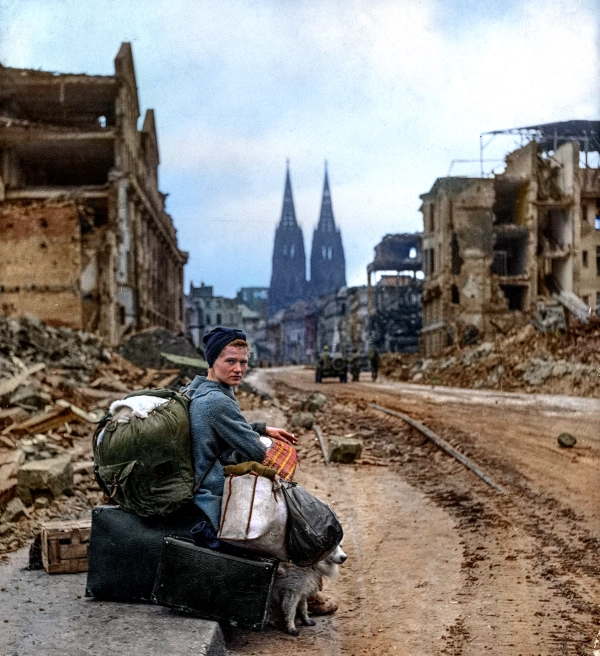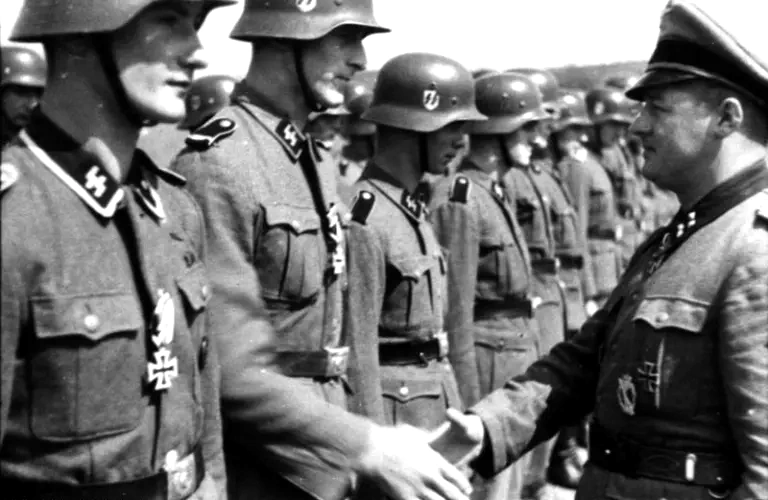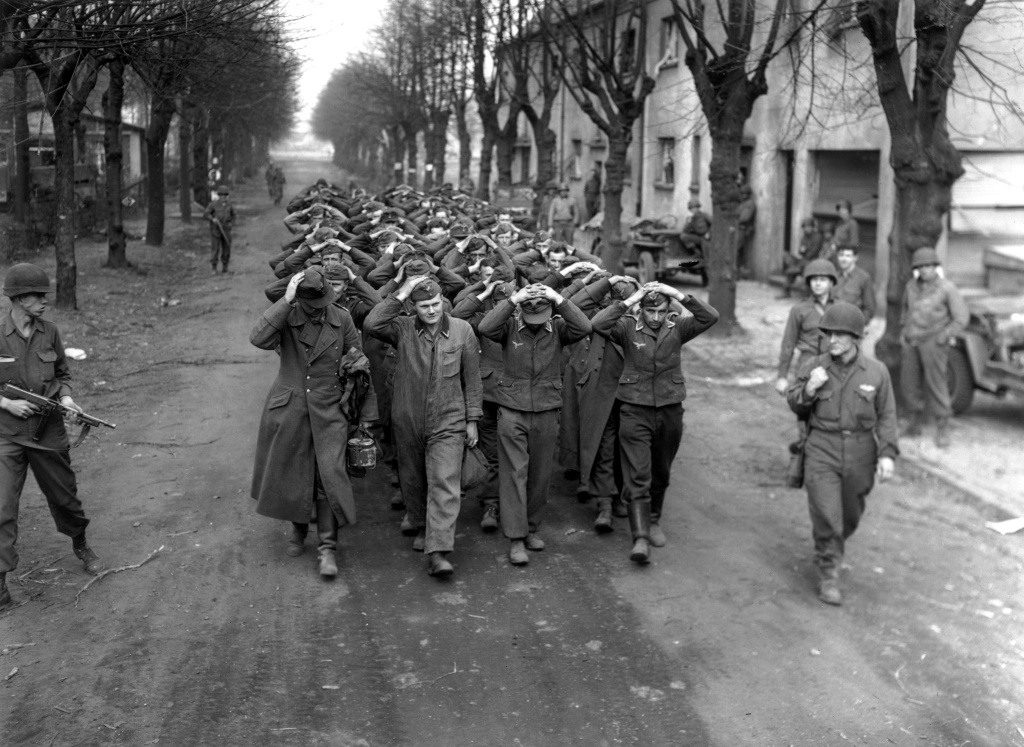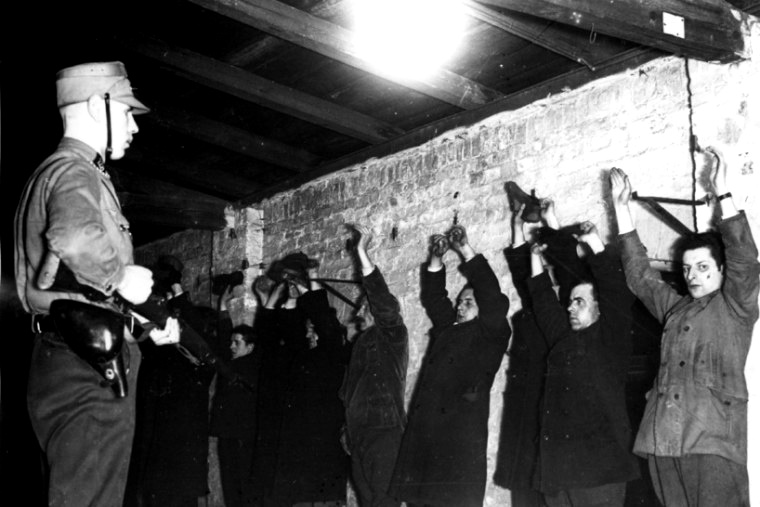Document Source: Chapter II of Defeat. The material presented herewith was prepared by the Headquarters Army Air Forces, Mediterranean Theater of Operations, Intelligence Section, and is published for official use. January 1946, Headquarters US Army Air Force, Office of the Assistant Chief of Air Staff, Washington D.C.
FOREWORD
by Doc Snafu (November 14, 2022.)
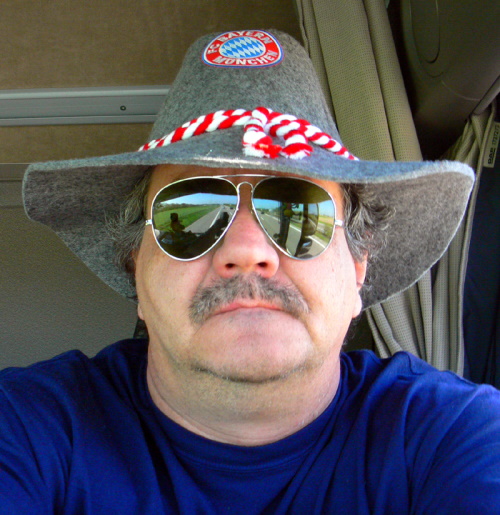 Since May 1945, many people still wonder how such a prodigious, modern war machine was defeated in all Theaters of Operations, North, South, West, and East in less than a few months. Technologically advanced in almost every field, Luftwaffe (Air), Kriegsmarine (Sea), and (Heere) Ground, the power and efficiency of American industry does not explain everything, because even with unlimited quantities of machines for war, it still needed exceptional men to make them work on the battlefields. My purpose here is not to praise or condone the German Army as a whole but simply to confront the reader with a multitude of responses to explain what led the Nazis to their downfall particularly because the majority of the German officers, generally issued from the German aristocracy, were at this time neither in phase with their subordinates and in most of the cases with the General Command.
Since May 1945, many people still wonder how such a prodigious, modern war machine was defeated in all Theaters of Operations, North, South, West, and East in less than a few months. Technologically advanced in almost every field, Luftwaffe (Air), Kriegsmarine (Sea), and (Heere) Ground, the power and efficiency of American industry does not explain everything, because even with unlimited quantities of machines for war, it still needed exceptional men to make them work on the battlefields. My purpose here is not to praise or condone the German Army as a whole but simply to confront the reader with a multitude of responses to explain what led the Nazis to their downfall particularly because the majority of the German officers, generally issued from the German aristocracy, were at this time neither in phase with their subordinates and in most of the cases with the General Command.
Many peoples interested in World War II claim that history is always written by the victors. I agree with them because, in the end, the victors often come to fight for a just cause which in the case of the period 1933-1945 in Germany, is a particularly real thing if it is based solely on these exactions committed by Nazis on millions of prisoners used to their death. However, let us remain impartial and confine ourselves solely to the military aspect of this conflict. If I have chosen to publish this archive it is because it was not written by the victors but by German prisoners, often officers, who at the end of 1945 were able to say what was on their hearts without the risk of having the Gestapo in front of their house the next morning and having no accountability anymore to anyone. Obviously, you will become among these prisoner responses those coming from demoralized soldiers, from soldiers imbued with a desire for revenge as well as from soldiers happy that this madness is finally over. Others, Nazis from head to toe will also be among the speakers.
Finally, it is up to you, the reader, to retain what you will decide to retain.
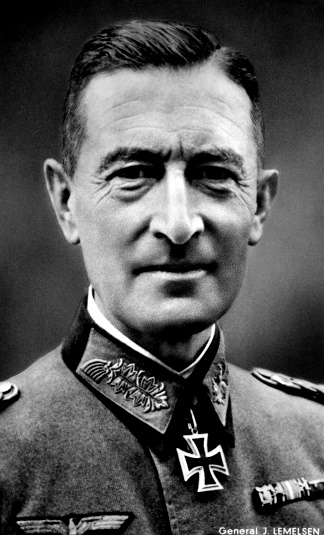 Mistakes of the German Leaders, Before and During the War
Mistakes of the German Leaders, Before and During the War
by General der Panzertruppen Joachim Lemelsen
August 23, 1945.
(Archive Foreword) German general officers captured in Italy have had ample time to think about and discuss the causes which led to Germany’s defeat. Their mood is one of sober reflection and while there are wide differences of opinion as to which factors were most directly responsible for the debacle, a certain pattern of agreement exists. The fact that all the views represent the postwar realization of blunders, which at the time of commission were probably viewed as normal or even exceptionally brilliant moves, does not detract from their value as object lessons on the consequences of one-man government. Several generals were asked to describe what, in their opinion, were the most serious mistakes made by Nazi Germany, before and during the war; their comments are presented below. The full report of Gen Lemelsen is quoted, and the statements of other generals have been used to amplify or contradict his views.
Mistakes in Foreign Policy
The chief mistakes of Hitler’s foreign policy seem to have been:
– a. That he himself, because of the great domestic improvement in Germany after his assumption of power and the easy victories, both diplomatic and military (ex. reoccupation of the Rhineland and rejoining of Austria to the Reich), became much too impressed with his own capabilities in the field of foreign politics. His associates saw to it that he was strengthened in this idea.
– b. Because of this, he overestimated the strength of the German people who were neither politically nor militarily in a position to carry through such a foreign policy.
– c. That he was poorly advised from the point of view of foreign politics. The Reichsminister of Foreign Affairs, SS-Obergruppenführer Joachim von Ribbentrop’s diplomatic attainments were certainly small. Representatives of Germany abroad were to some extent unsuited and as experts unschooled (ex. Ribbentrop – in Great Britain and Manfred Freiherr von Killinger in Bucharest). In this way, Hitler was, if not misinformed, at least not completely informed about the domestic situation and war potential of other states and thereby got a false picture of them.
– d. That he apparently believed the only way to accomplish his goal abroad was by means of the sword instead of exhausting all possibilities of a peaceful and diplomatic nature.
– e. That he did not know how to obtain allies (ex. England) in company with whom he could have accomplished peaceful reconstruction of Germany without endangering the peace of the world. Italy was, as history has so often shown, not a dependable ally; to say nothing of the Balkan countries.
– f. That he apparently never clearly recognized that Germany alone would eventually, whether in the near or distant future, have to succumb to the superiority of its enemies and that he did not seek means when this became apparent to end the war, but rather delivered the people to complete destruction.
Military Mistakes – Organizational
– a. The general structure of the armed forces was probably determined by great fear of putting too much power into the hands of a single supreme commander of the armed forces. Instead of a single clear command for all the armed forces, there was built up an organization with no clearly established chain of command which was, accordingly, clumsy in its operation. This was evident in the creation of the German Luftwaffe under Reichsmarschall Hermann Göring as an independent branch of the armed forces instead of incorporating or attaching the Luftwaffe Force to the Army and the Kriegsmarine command. This was further indicated in the creation of the Waffen SS under Reichsführer-SS Heinrich Himmler as an independent branch of the armed forces alongside of the Army. There was absolutely no military necessity for the creation of the Waffen SS. Its existence alongside the Army had a most unfavorable effect on Army personnel in that the SS got the best material at the expense of the Army and in every respect was given preference in treatment and attention. Because of this, the Army felt discriminated against.
– b. The same applies to the creation of the Volks Grenadier Divisions (VGD) which were created later under the command of Himmler, and these likewise were given preference in their treatment and supplies although they in no way contributed more than the Army divisions.
– c. This multiplicity of commands within the armed forces, which was sanctioned by all those in especially high positions, made itself felt disadvantageous in the entire prosecution of the war.
A – Few Examples: (1) The Waffen SS Divisions were only under the tactical command of the Army headquarters and even in this regard only to a limited extent. Himmler repeatedly took a hand in the battle disposition of his SS units without having sufficient knowledge of the situation at the front. (2) The Fallschirmjaeger (Paratroopers) were under the tactical command of the Army and likewise under the Luftwaffe. In this way, much unnecessary friction, misunderstanding concerning differences in equipment and rations, and difficulties in personnel policies came about. When, for instance, an Army division fought side by side with an SS division or a Volks Grenadier Division, there was no possibility of exchange of personnel or materiel or shifting of units between them.
– d. One of Hitler’s most serious mistakes was that he took military leadership into his own hands (apparently because of great distrust of his own General Staff) although he personally possessed absolutely no training or experience in army leadership. Only in this way is it possible to explain many serious mistakes in leadership during this war. Many lessons from the history of warfare, especially from the wars of Frederick II and of Napoleon I, were not respected. Hitler finally came to believe himself, as he was told by those around him, that he was the greatest military leader of all time and he demanded that all decisions having to do with the operative and even the tactical direction of the war be subject to his express personal decision.
– e. The command of the Volkssturm by agents of the Nazi Party thereby created still another branch of the Armed Forces. The Volkssturm should have been absorbed into existing units of the Army.
– f. The appointment of Gauleiters as Commissars for the defense of the Reich. The military prosecution of the war is a matter for the armed forces and can only be accomplished by soldiers.
– g. The change over of the German aircraft program to fighters only. This, however, was probably strongly influenced by the disruption of the German industry by the Allied Air Forces.
– h. Poor personnel work. Army, Luftwaffe, Kriegsmarine, Waffen SS, and Volks Grenadier units each had their own personnel section without any central guidance.
– i. Officers who were too young were given positions of higher command only because they were brave and decorated accordingly, but training and experience were missing. They therefore usually failed very soon.
Operational and Tactical Mistakes
– a. Useless sacrifice of Corps and even Armies because of stubborn adherence to the tactics of holding a defense line under any condition, even though the individual position was weak and sufficient reserves were lacking. The results were breakthroughs on the part of the enemy and the loss of strong forces by encirclement. These forces were denied permission by the High Command, despite repeated requests, to make any attempt to break out to their own front (ex. Stalingrad).
– b. Every small withdrawal of a position after an enemy breakthrough, either to shorten the line or reestablish their forces for reasons of terrain, had to be authorized by the High Command and was subject to the decision of the Fuehrer. This practically always arrived too late. Large unnecessary losses were the result. This lack of confidence of the Fuehrer in the Army Commanders had a paralyzing effect on the enthusiasm with which they served. During the later stages of the war in Italy the Commanders of the Army Group and myself, as Commander of the 14.Army, called this to the attention of the High Command repeatedly and furthermore warned them that a retreat over the Po Valley under enemy pressure would result in a catastrophe. We proposed instead that the movement should be a planned one, but were refused. The results are well known.
– c. Overestimation of the value of stationary fortifications, especially coastal defenses on the English Channel and the Atlantic. Because of this, no rear defense zones were built in Belgium and France. There resulted in a shortage of defense positions available to the local commanders at the time of the strong enemy landing.
– d. Insufficient knowledge on the part of the High Command of the capabilities of combat units at the front in spite of truthful reports which for the most part were not believed by higher authority and were characterized by the Fuehrer as pessimism or lack of faith in victory. In the second half of the war, the withdrawal of divisions or regiments from the front for rest was no longer practicable since the necessary reserves were missing. The troops, therefore, stayed many months without relief or rest from combat duties from the front. Because of this they were completely overtired and reduced in numbers. This fact was not taken into account by the High Command when demands were made on the troops. On the maps of the High Command, a division remained a division. Representatives of the High Command appeared very seldom at the front to be oriented on the condition of the troops.
– e. At the time the High Command realized that the Luftwaffe was inferior to the Allied Air Force and recognized that as the bombing of the aircraft industry increased there was no longer any possibility to regain air superiority, it was their duty to end the war. Without an air force, no war can be won. After this time all sacrifices on the part of soldiers and war industry, civil population, and residential and cultural centers were nonsensical and would have been avoided by a wiser government. I consider it a crime that those in the armed forces were made to believe in the promised use of new weapons by which it was said air superiority would again be gained.
Mistakes – Domestic Policy
I can only describe that which I, myself, observed.
– a. Too autocratic a government. Suppression of all freedom of expression by the press, the radio, and the people. The people, and in fact the top leaders of the armed forces, were purposely not informed about the domestic measures and points of view of the High Command. Every personal opinion and every attempt at advice, criticism, or independent discussion was prohibited, suppressed, and prosecuted on the basis of a threat to the authority of the State.
– b. Lack of confidence on the part of Hitler in his officers. Because of this, supervision by the Gestapo and the Nazi Party of the families of the officers to make sure of their political reliability, especially after the 20th of July 1944.
– c. Strong agitation against the Armed Forces, especially against officers, on the part of the Nazi Party after the 20th of July 1944 (Dr. Ley’s speech to war workers).
– d. The introduction of National Socialist guidance officers. This was another expression of Hitler’s lack of faith in the reliability of the Army.
– e. Propaganda on the part of the SS for the withdrawal from the church especially of children who for the most part, came from families with a religious background. Severe limitations on the range of the activity of the chaplains although there was a great need for the spiritual guidance of the soldiers.
– f. Lack of truth in official Army reports during the last year. Coloring, or even concealment of defeats, damaged the confidence of the people and especially of the troops at the front in their leaders, since they had experienced the developments themselves.
– g. My personal position on the facts which have been exposed to the public view of the world and the German people concerning conditions in the concentration camps, measures taken by the Gestapo in occupied territory, and destruction of the Jewish population are the same as that of every genuine soldier and officer. I repudiate them entirely. We learned of these developments with horror and will have to bear resolutely and courageously the consequences that these crimes carry with them.
In addition to the views expressed above, the following remarks were made by the other Generals as indicated.
How Did Hitler Gain Control?
by Generaaloberst Heinrich von Vietinghoff (Scheel)
The German postwar (WW1) democratic government was not successful in giving the German people ‘work and bread’ or achieving any substantial aid from other countries or from the League of Nations. The domestic situation grew increasingly worse and especially after 1930 new and difficult crises seemed inevitable. According to the public view, it could not be permitted to continue thus. New methods had to be found in order to overcome their great need; work for everyone and through this at last a chance to find a secure life for all. This alone – not the reported desire for world conquest – caused the majority of the people to give their support to the political activities of Hitler with high hopes.
How Did Hitler Gain Control?
by Generalmajor Hans Leyers
Considerations of foreign policy as well as disgust at the goings-on in Parliament were stronger than the distrust of those parts of the Party Program which did not correspond to the conservative way of thinking. If the foreign powers had given Heinrich Bruening a little bit of rope and let him have some successes, however small, in the field of foreign politics, they would have taken the wind out of Hitler’s sails. The national intelligentsia, without which he would have been powerless to do anything, would in that case never have gone over to him.
How Did Hitler Stay in Power?
Generaaloberst Heinrich von Vietinghoff (Scheel)
– a. Hitler won the support of the people because of indisputable, quick, and large successes in the field of domestic policy; unemployment was overcome; government finances were made secure on a new principle – productive work instead of gold.
– b. Substantial improvement in the position of the working class by means of public charities, subsistence for mother and child, strength through joy, beauty of work, to mention only a few. These increased the confidence of the people in the new government to an extraordinary extent. Everybody recognized that such revolutionary reform could only be carried through by a unified strong government. The disquieting symptoms of the Party and the Gestapo which appeared even at that time were explained as phenomena that inevitably accompanied every large revolution – France in 1789 or Russia since 1917.
How Did Hitler Stay in Power?
by Generalmajor Hans Leyers
– a. His successes were obvious and clearly visible, while the disadvantages made themselves feel slower and more diverse. Foreign and home politics were cleverly combined. Hitler only twice appealed to the people; in both cases, the nation was called on to answer questions on foreign politics: 1. Occupation of the Rhineland. 2. Germany’s withdrawal from the League of Nations. Many considered it their patriotic duty not to attack Hitler from the rear in these questions, in spite of their misgivings on his policy at home, and thus it came about that Parliaments was elected which only served as theatrical backgrounds. If, for example, Hitler had dared to call the nation to the polls while the conflict with the churches was at its height, or after the 9th of November 1938 (after the Pogrom), then, in spite of the terror, a completely different picture would have resulted.
– b. Hopes for an improvement, especially as the worst excesses never became known and there was no way of distinguishing truth from hostile propaganda.
– c. The thought always remained that the big clean-up in the Party was still to come. This thought was continuously supported and nourished by: 1. Hitler’s great rhetorical powers. 2. His disarming charm which has been confirmed by all who came into personal contact with him.
– d. The principle of “Divide et Impera”, which Hitler applied everywhere.
– e. A rigid and minute Party organization which, through Kreisleiter, Blockwart, and Zellenwart (Party overseers) were able to gain a picture, properly indexed, of the political reliability of every citizen. Thereby existed increased fear of being taken to a concentration camp without previous warning or proceedings and for an unlimited length of time.
– f. The foregoing motives resulted in the lack of any action worthy of mention against the regime prior to the outbreak of war. If such action had been attempted, it may be presumed with certainty that it would have been nipped in the bud immediately. There were no holes in the net spread over Germany by the Gestapo in conjunction with the Party organizations.
